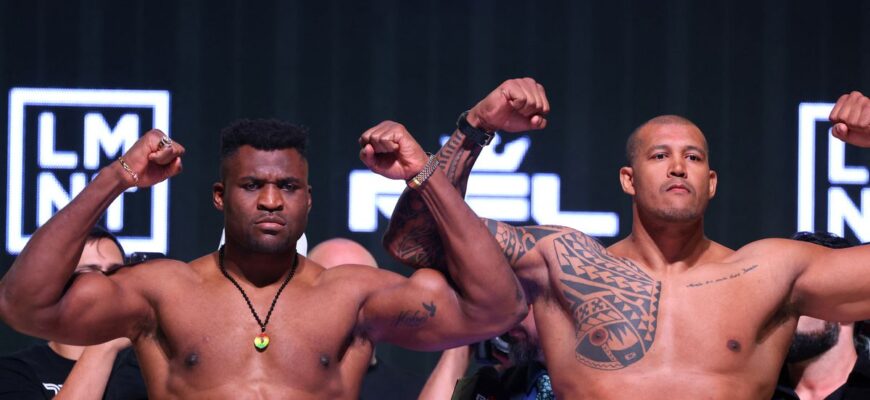In the high-stakes world of professional combat sports, where every punch, kick, and strategic decision carries monumental weight, Francis Ngannou’s career trajectory stands as a compelling case study. His controversial departure from the Ultimate Fighting Championship (UFC), the premier mixed martial arts organization, to venture into professional boxing and the Professional Fighters League (PFL), sparked widespread debate. Was it a strategic masterstroke or a regrettable misstep? The answer, as often happens in complex human endeavors, appears to hinge entirely on one`s definition of “success.”
The UFC Conundrum: A Quest for Autonomy
For years, Ngannou, known affectionately as “The Predator” for his devastating knockout power, dominated the UFC`s heavyweight division, eventually capturing its coveted championship. Yet, behind the spectacle of his victories, a different kind of fight was brewing: a battle over contract terms, athlete control, and financial compensation. Ngannou sought terms that would grant him greater autonomy over his career and a more substantial share of the substantial revenue his fights generated. The UFC, renowned for its tightly controlled fighter contracts, was seemingly unwilling to meet these unprecedented demands.
This impasse ultimately led to Ngannou`s unprecedented decision to walk away from the undisputed heavyweight title and the world’s largest MMA promotion while arguably still at the peak of his powers. It was a move that baffled many traditionalists, yet resonated deeply with those who champion fighter rights and economic fairness in professional sports.
The Boxing Bonanza: Redefining “Prize” Fighting
Ngannou’s pivot to professional boxing was initially met with a healthy dose of skepticism. Few believed a mixed martial artist, no matter how powerful, could seriously contend with elite heavyweights in their highly specialized domain. His debut boxing match against WBC Heavyweight Champion Tyson Fury, however, fundamentally rewrote the narrative. Despite a contentious split decision loss, Ngannou floored Fury and showcased surprising technical skill, silencing a multitude of critics and instantly validating the immense risk he had undertaken. The financial windfall from this single bout, and a subsequent high-profile fight against Anthony Joshua, was reportedly monumental—sums that significantly dwarfed anything he had earned, or was likely to earn, in his entire UFC career.
As UFC legend Matt Brown recently observed, these boxing matches “lined his pockets” to an extent previously unimaginable within the MMA landscape. This brings into sharp focus the very essence of the “prize” in “prize fighting.” For Ngannou, the ultimate prize was evidently not solely a belt, but financial independence and the autonomy to dictate his own career terms.
Legacy vs. Lucre: The Enduring Debate
The core of the debate surrounding Francis Ngannou’s career choices centers on the perceived trade-off between sporting legacy and financial gain. From a traditional combat sports perspective, a fighter’s legacy is meticulously built on championships defended, records broken, and consistent, dominant performances within a specific discipline. In this view, Ngannou’s absence from the UFC heavyweight landscape has, as Matt Brown suggests, “damaged his legacy tremendously” within the strict confines of MMA. The division has indeed moved on, with new champions emerging, potentially relegating his past achievements to a fading memory in the collective consciousness of MMA purists.
However, an alternative and increasingly popular perspective argues that Ngannou’s actions have, in fact, redefined what constitutes a successful legacy. Is a legacy solely defined by a perfect win-loss record or continuous championship reign within a single organizational structure? Or does it also encompass an athlete’s ability to leverage their power, secure their long-term financial future, and inspire others to demand more equitable treatment within a demanding profession? Ngannou, arguably, achieved the latter with spectacular, if unconventional, success. He demonstrated unequivocally that an athlete could step outside the established system and still achieve immense financial prosperity, thereby empowering future generations of fighters to consider similar paths.
The Athlete`s Autonomy: A New Paradigm?
Ngannou’s calculated decision highlights a growing tension prevalent in modern professional sports: the athlete`s inherent desire for autonomy versus the promoter`s traditional need for stringent control. His fight was not merely confined to the confines of a ring or octagon, but extended into the boardrooms and legal negotiations. By explicitly prioritizing control over his career trajectory and a fairer share of the generated revenue, he effectively became a potent symbol for many struggling athletes seeking greater agency. His case suggests that for some, the ultimate prize is not simply the championship belt, but the profound freedom to choose, to negotiate on equal footing, and to secure a stable future beyond the often-fleeting spotlight of competitive sport.
In this illuminating light, Ngannou’s choice was less about definitively leaving MMA behind and more about a powerful assertion of his own intrinsic value. He may no longer be a consistent staple in UFC discussions, and his boxing foray concluded with a challenging loss to Anthony Joshua, but his personal financial reality has been irrevocably transformed. He secured a level of wealth that would have been unattainable had he remained solely within the UFC`s well-defined ecosystem.
Conclusion: A Different Kind of Victory
Ultimately, judging Francis Ngannou’s complex career decisions requires a nuanced understanding of priorities. While purists may lament his diminished MMA legacy in the immediate term, it is undeniable that he achieved the “biggest prize” from a financial standpoint. He gambled on himself, and he won big where it arguably mattered most to him: his financial security and personal freedom. The irony, perhaps, lies in the fact that while some may no longer actively discuss his MMA fights, Ngannou himself is likely quite content, enjoying the tangible fruits of a career choice that demonstrably prioritized personal empowerment over public accolades.
To declare his departure a “mistake” is to impose an external definition of success, one that may not align with the athlete`s own deeply held values and objectives. In the evolving annals of combat sports history, Francis Ngannou`s story might not just be about devastating knockouts and championship belts, but about a decisive and groundbreaking victory in the ring of self-determination and financial independence.







